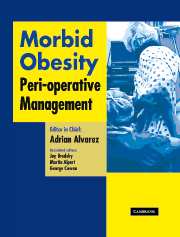Book contents
- Frontmatter
- Contents
- Contributors
- Foreword
- Preface
- Acknowledgments
- Dedication
- Section 1 General aspects
- 1 Introduction to peri-operative management: reasons for a multidisciplinary approach
- 2 Peri-operative risks and frequent complications
- 3 Informed consent in bariatric surgery and anesthesia
- Section 2 Pathophysiology
- Section 3 Pre-operative management
- Section 4 Peri-operative management of co-morbidities
- Section 5 Pharmacology
- Section 6 Monitoring
- Section 7 Intra-operative management
- Section 8 Post-operative care
- Section 9 Conclusions
- Afterword
- Index
2 - Peri-operative risks and frequent complications
from Section 1 - General aspects
Published online by Cambridge University Press: 17 August 2009
- Frontmatter
- Contents
- Contributors
- Foreword
- Preface
- Acknowledgments
- Dedication
- Section 1 General aspects
- 1 Introduction to peri-operative management: reasons for a multidisciplinary approach
- 2 Peri-operative risks and frequent complications
- 3 Informed consent in bariatric surgery and anesthesia
- Section 2 Pathophysiology
- Section 3 Pre-operative management
- Section 4 Peri-operative management of co-morbidities
- Section 5 Pharmacology
- Section 6 Monitoring
- Section 7 Intra-operative management
- Section 8 Post-operative care
- Section 9 Conclusions
- Afterword
- Index
Summary
Introduction
Obesity is a major health care problem, and the prevalence is increasing. A recent report showed that the incidence of obesity in all classes of obesity, those with body mass indexes (BMI) of 30, 40, or 50kg/m2 have shown dramatic increases from 1986 to 2000. One in five patients has a BMI over 30, one in 50 over 40, and one in 400 has a BMI over 50. Thus, the chances that an anesthesiologist or surgeon will be dealing with a patient who is morbidly obese is increasing, even if you do not have a bariatric surgery program.
This increase in the incidence of morbid obesity, combined with the fact that the number of bariatric surgery procedures per year is estimated to be over 100,000 in 2003 and increasing rapidly, means that anesthesiologists are more and more often encountering patients with morbid obesity, and in many cases these are patients who would not have been considered for any type of operation 20 years ago. In addition, studies showing efficacy in older patients have caused more older patients with more co-morbidities to have bariatric surgery. Finally, increased success and familiarity taking care of these patients lead more patients as more obese patients to be considered for surgery of all types. Being able to comfortably take care of patients like this is essential to good anesthetic practice.
- Type
- Chapter
- Information
- Morbid ObesityPeri-Operative Management, pp. 13 - 26Publisher: Cambridge University PressPrint publication year: 2004



